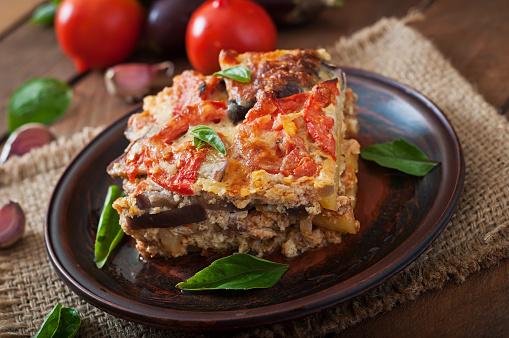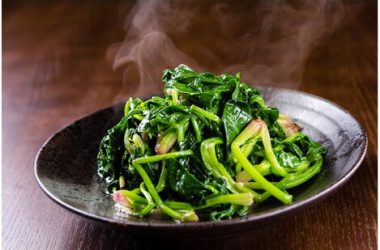
Disclaimer: Today’s article contains information that might make you question reality as you know it.
MOUSSAKA ISN’T GREEK?
The year is 1990. That is the same year when the Hubble Space Telescope was launched, East and West Germany reunified, Baltic states declared independence from the Soviet Union, J.K. Rowling began writing “Harry Potter and the Philosopher’s Stone”, and Madonna’s “Vogue” was all over the radio. In short, it was a turbulent year which was about to get even more intriguing. It was the year when Anthea found out that moussaka is not an authentic Greek dish.
“What?” I hear your puzzled voice say. Before I take you any further in our story, allow me to go back and tell you the tale of this shocking discovery.

THE DAY ANTHEA’S WORLD TURNED UPSIDE DOWN
The lights are on, the blue carpet has been unrolled, and the stars are out. Within the walls of a Greek restaurant, just off the busy Queensway Road, a waiter fixes his white pleated fustanella with a serious look. Yet, like any good story, ours begins not with the waiter but with two heroes – a woman and a man.
She is Greek, he – an Egyptian that goes by the name of Ashraf. They are both in their early 20s, both flirting and sneaking glimpses at each other while the other is not looking. The waiter greets them with a smile and accompanies them to their table under the sound of soft syrtaki music. The conversation is held to an appropriate murmur, and the woman whispers the order in the waiter’s ear.
She has decided to surprise her companion with a unique Greek dish. Not much later, the waiter is carrying two plates of a peculiar meal – aubergine (eggplant) slices baked in a ground beef sauce, topped with a thick layer of béchamel sauce.
“Oh, moussaka!” shouts Ashraf. “I did not know they serve traditional Egyptian dishes here, too!”, he exclaims in surprise.

MOUSSAKA – EGYPTIAN?
“Traditional… Egyptian… dish…” Anthea says by dragging and dropping each word in disbelief. She looks at the moussaka and then Ashraf, Ashraf and then the moussaka again. “Egyptian? But isn’t moussaka uniquely Greek?”
Sensing the confusion on the table, the waiter follows Anthea’s look. He, too, looks at Ashraf and the moussaka. “Egyptian?” he asks, as the question upends everything that is holding him together. “But moussaka is Greek.” He looks nervous, repeatedly pressing the fustanella to his body. “It is Greek, dear,” he declares in a confident voice.
Ashraf laughs. “It is Egyptian, too”, he remarks.
The three exchange glances and fall into silence.

THE HISTORY OF MOUSSAKA
It is a common misconception that moussaka is uniquely Greek. This is even found in various culinary encyclopaedias and reference books, and sometimes the beginning of its history goes back to mythological antiquity. In Walt Disney’s animated film Hercules, the god Hades eats moussaka and chokes on it.
Moussaka is not an everyday dish. It is usually prepared as a special treat for guests and family on festive days. Imagine it as an exotic version of lasagne, minus the pasta. It is commonly cut into squares and served warm, but not hot. That is because the dish needs some time to firm up.

THE INTERNATIONALITY OF MOUSSAKA
Nevertheless, moussaka is common to Greece, Turkey, and the Balkans. Moussaka is usually made with layered aubergine slices, alternating with minced meat, onions, and often topped with a thick layer of béchamel sauce. Yet, they are regional variations of it. For instance, the Turkish moussaka is not layered. Beside the eggplants, onions, and the minced meat, the Turkish also add green peppers and tomatoes. What’s more, the meal is further accompanied by cacık (Turkish version of tzatziki) and pilaf (rice with orzo).
In the Bulgarian, Macedonian, Romanian, and Serbian moussaka the dominant vegetables are potatoes. In addition, all products are cooked together without frying separately and without layering. Instead of béchamel sauce, a yoghurt-based sauce is used.
Interestingly, even the Greek version as we know it did not originate with the béchamel sauce on top. That’s right – béchamel sauce was not always an integral component of moussaka! This version came into existence in 1910. A classically trained chef, Nikolaos Tselementes, was responsible for popularising the modern version of the dish. By doing so, he created one of the most iconic dishes of modern Greek cuisine. But back in the 19th century, women of Smirni used to prepare moussaka without béchamel sauce.

MOUSSAKA IN THE BALKANS
It is worth noting that this dish is missing from the descriptions of Western travellers who travelled through the Balkans between the 16th and 18th centuries. It is also strange that moussaka is not mentioned in the cookbook of Petko Slaveykov, published in Constantinople in 1870.
There are recipes for stews, soups, meatballs, kebabs, dolma, pilaf, and many other things, mostly from oriental cuisine, but moussaka is lacking. Is it possible that its introduction into the Balkan dining habits happened a hundred years ago or a little less?
More in-depth research in the future may establish the truth, but it’s unlikely to change the belief among each of the Balkan people that moussaka is, above all, their invention.
THE TRUE ORIGINS OF MOUSSAKA
A question remains: where does moussaka come from originally? It is widely believed that it has Middle Eastern origins, as it was introduced when the Arabs brought aubergines to Greece. The name is derived from the Turkish musakka, which came from the Arabic word musaqqa’ah, meaning chilled.
In Arabic cuisine, this is a chilled dish of tomatoes and aubergines, resembling more of a salad than a heart-warming meal of minced meat and vegetables, placed under an appetisingly golden topping of béchamel sauce.
Wherever moussaka comes from, you can try an absolutely delicious moussaka in Benitses, Corfu, just several steps from your door at Bella Vista Beach Hotel & Studios.

THE EARLIEST MOUSSAKA RECIPE
A full recipe for moussaka can be found as far back as the 13th century, in the Baghdad Cookery Book. The Levantine Arabs had a dish called mousakhkhan, which in Arabic means something to be heated. This could be where the word moussaka was derived. Yet, the first known reference to the word itself appears in 1862 when Turabi Efendi published a moussaka recipe in the Turkish Cookery Book.
To sum up, the moussaka as we know it today is a Europeanised version of a dish of Arabic origin, introduced to Greece via Turkey.
Who would have guessed?
DID MOUSSAKA DIVIDE EUROPE?
Interestingly, according to credible rumours, during the talks between Churchill and Stalin on the division of the Balkans, British intelligence had whispered to Sir Winston, among others, that the Greeks were layering their moussaka, while the Bulgarians, Serbs and Romanians were not. It is not clear whether – and to what extent – this secret report influenced the final editing of that historical napkin on which the two rulers agreed on the post-war division of Europe, but it is possible that it added its contour in cutting the Balkan map.
Moussaka is certainly a representative element of the national mentalities of the Balkan peoples as it carries specific information about their anthropological features and, therefore, it is important to know it from the inside.

If one day there happens to be disputes among the Balkans about the historical authorship of a well-known dish among all Balkan countries, the main culprit will probably be the moussaka. Bulgarians, Macedonians, Turks, Greeks, Romanians, and Serbs all consider moussaka to be an intimate part of their own culinary ancestry.
MOUSSAKA, AUBERGINES OR NOT?
This iconic dish for the Balkans and the Orient is still subject to the artistic regional diversity of the products used – from its arrangement in the tray to the final taste. That is also why Euro bureaucrats would face serious challenges if one day they decide to conceptualise the correct European moussaka.
If, however, attempts are made in this direction, it is possible to raise a powerful Balkan movement in defence of moussaka and, above all, the right of everyone to arrange and bake it as they please.
Thus, the traditionally feuding Balkans can finally unite for a common cause and shout in one voice: “Get your hands off the moussaka!”












